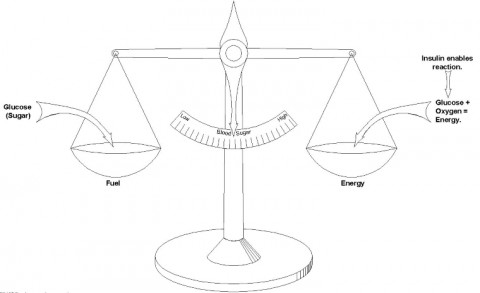DrCarney.com Blog
Blood-Sugar Simplified
While the biological mechanisms of blood-sugar control are indeed complicated, the basics are quite simple: blood-sugar is an equilibrium between supply and consumption. Sugar, specifically glucose, is biology's primary fuel. The drawing above illustrates how blood-sugar is a simple balance between sugar intake and the "burning" of it as a fuel. Consuming foods from which sugar is extracted or synthesized is the fuel supply - represented in the left-hand scale pan. The right-hand energy pan represents the sugar flowing in the blood stream ready for "burning" or conversion to energy. As the sugar is burned, blood-sugar becomes lower. Just as the fuel in your car's gas tank gets lower as it is converted to energy making the car go.
The complicated part is that blood-sugar is rigidly controlled. Surprisingly, blood-sugar is not controlled on the fuel (input) sided of the scale. Blood-sugar is actually controlled on the energy side. Consuming more or less sugar does not affect blood-sugar, unless the energy side is compromised. The control element is insulin, as indicated in the drawing. Insulin can be likened to the gas petal in your car. As you press the petal down, you get more energy - consuming more fuel. Lifting your foot from the petal reduces the energy and likewise reducing fuel consumption. Adding more sugar (fuel) to the blood stream prompts more insulin thus increasing energy consumption and maintaining balance. How finely the system works is dependent on the effectiveness of the insulin. A reduction of insulin's control is known as Insulin Resistance.
Insulin Sensitivity (the opposite of insulin resistance) means that blood-sugar regulation is very sharp, resilient and almost impossible to overwhelm. It means that you enjoy child level energy (regardless of age). There are two primary effects on insulin resistance; food and exercise. Animal sourced foods and dietary fat (regardless of source) increases insulin resistance. Exercise decreases insulin resistance. Maintaining dietary fat calories below 10% decreases insulin resistance. Above 10% and insulin resistance increases. Above 25% overwhelms any reduction offered by exercise. To ensure the greatest metabolic efficiency, simply keep dietary fat calories below 10%, consume zero animal products and keep active - and Enjoy Life!
Please understand that I am not a medical professional in any capacity. This writing is only to share my experience and what I have learned from it.
DrCarney.com allows Member Blogs. Opinions in Member Blogs are views of the Member Blogger and not necessarily of Dr. Carney. Registered Users may request a FREE upgrade for blogging permission. Bloggers agree to support Dr. Carney's Starch-Smart-System.
When you subscribe to the blog, we will send you an e-mail when there are new updates on the site so you wouldn't miss them.




